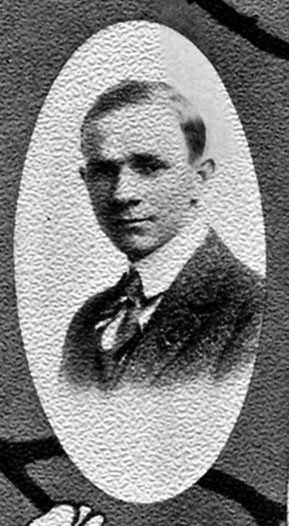Dewey Westaway ’17
 Suzanne Westaway, Class of 1954, and Lauralee Westaway, Class of 1957, provided this information about their father, Dewey Westaway:
Suzanne Westaway, Class of 1954, and Lauralee Westaway, Class of 1957, provided this information about their father, Dewey Westaway:
Dad grew up in the same house that he raised us in and that we still live in. At Tech, Dad took shop classes. He knew how to join miter corners and repair electric appliances. He was always able to work around the house doing things as he had a little bit of knowledge of a lot of things. He studied Spanish at Tech and spoke it exceptionally well. He could recite poems in Spanish and English. There’s something to be said of the discipline of that old rote memory style of education. He was a very good public speaker. He could always introduce someone at a speech or open a ceremony and he did it with ease. More rhetoric was taught at that time. He enjoyed high school. He went out for track, but after he came in last in one race, he quit. He also played baseball and was a good swimmer. Al Kyte was there when he was.
Our father’s father was killed in World War I when a German U-boat torpedoed his merchant ship. Our father was still at Tech at the time of his father’s death, so at age 16 or 17, he became responsible for his mother and sister, both of whom were ill. Our father grew up fast. If his father had lived, he would have gone to college, but he had to work after graduation to support his family. Dad was very mature when he graduated in 1917.
Dad had learned enough drafting at Tech to get a job working at the Hanlon Shipyards in Oakland, which later became Morse Shipyards in the Oakland Estuary. It manufactured ships for World War I. He got the equivalent of about two years of junior college at Tech. That’s how advanced it was.
After graduation, our father joined a reserve unit of the Army Air Corp which flew out of Crissy Field in San Francisco. He never went overseas, but he did learn to fly. They didn’t have navigational tools back then and their flight instructors just told them that to land at Crissy Field, they should line up with the Berkeley Pier! World War I was a huge event in our father’s life, in everyone’s life who lived through it. When we were growing up in the 30s and 40s, you could still see victims of gassing from World War I. The telltale sign was a badly deformed nose and our parents used to tell us, “He was gassed. Don’t stare.”
After the shipyards, our father went to work for an electrical company in San Francisco. What he learned at Tech led to that as well. His Tech education served him well.
Our mother, Mae Morse, went to Tech too, but she left before she finished as my father’s sister did. It was common for women of that generation to go through junior year and then leave to do business studies at, for example, Heald Business School, for a year. A lot of the Italians just went to work at canneries or laundries. There was a sense in general in our parents’ day that girls didn’t need to be educated. They needed to generate income or to find a husband. Our mother talked about parties and sporting events, maybe a sorority at Tech, but she was not much of a student. She wasn’t a big reader, but she was really funny and very creative.
James Morse, our mother’s brother, graduated in 1922 or 1923 and her sister Grace graduated in 1931 or 1932. She was seven years younger than our mother and by then, it was more accepted for girls to stay in school. James went on a football scholarship to Fresno State. His son William Morse also went to Tech and graduated in around 1948.
